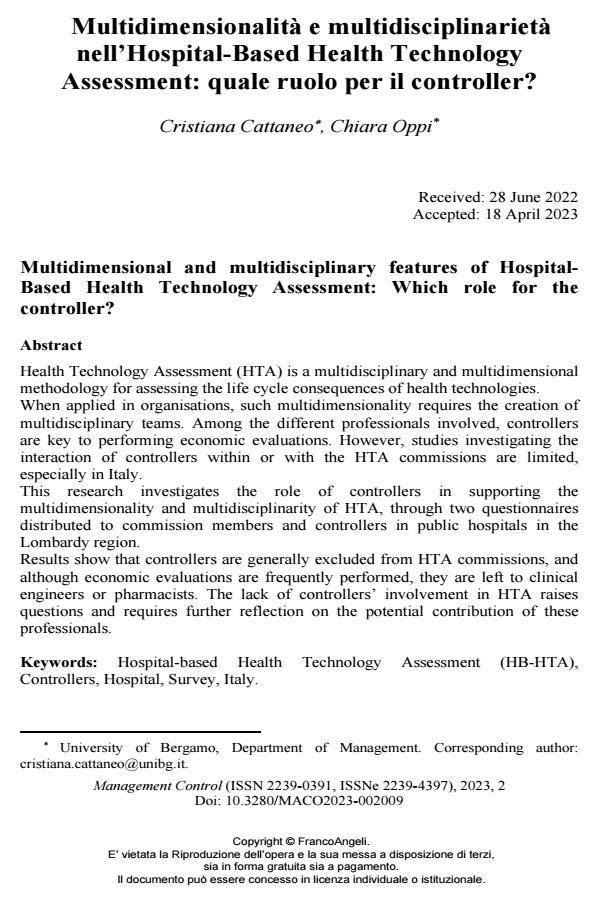Multidimensionalità e multidisciplinarietà nell’Hospital-Based Health Technology Assessment: quale ruolo per il controller?
Titolo Rivista MANAGEMENT CONTROL
Autori/Curatori Cristiana Cattaneo, Chiara Oppi
Anno di pubblicazione 2023 Fascicolo 2023/2
Lingua Italiano Numero pagine 25 P. 187-211 Dimensione file 436 KB
DOI 10.3280/MACO2023-002009
Il DOI è il codice a barre della proprietà intellettuale: per saperne di più
clicca qui
Qui sotto puoi vedere in anteprima la prima pagina di questo articolo.
Se questo articolo ti interessa, lo puoi acquistare (e scaricare in formato pdf) seguendo le facili indicazioni per acquistare il download credit. Acquista Download Credits per scaricare questo Articolo in formato PDF

FrancoAngeli è membro della Publishers International Linking Association, Inc (PILA), associazione indipendente e non profit per facilitare (attraverso i servizi tecnologici implementati da CrossRef.org) l’accesso degli studiosi ai contenuti digitali nelle pubblicazioni professionali e scientifiche.
Health Technology Assessment (HTA) is a multidisciplinary and multidimensional methodology for assessing the life cycle consequences of health technologies. When applied in organisations, such multidimensionality requires the creation of multidisciplinary teams. Among the different professionals involved, controllers are key to performing economic evaluations. However, studies investigating the interaction of controllers within or with the HTA commissions are limited, especially in Italy. This research investigates the role of controllers in supporting the multidimensionality and multidisciplinarity of HTA, through two questionnaires distributed to commission members and controllers in public hospitals in the Lombardy region. Results show that controllers are generally excluded from HTA commissions, and although economic evaluations are frequently performed, they are left to clinical engineers or pharmacists. The lack of controllers’ involvement in HTA raises questions and requires further reflection on the potential contribution of these professionals.
Parole chiave:Hospital-based Health Technology Assessment (HB-HTA), Controllers, Hospital, Survey, Italy.
- Controllo di gestione e relazioni intraorganizzative: la prospettiva del controller Oppi Chiara, Vagnoni Emidia, Cattaneo Cristiana, Galizzi Giovanna, in MANAGEMENT CONTROL 3/2024 pp.155
DOI: 10.3280/MACO2024-003008
Cristiana Cattaneo, Chiara Oppi, Multidimensionalità e multidisciplinarietà nell’Hospital-Based Health Technology Assessment: quale ruolo per il controller? in "MANAGEMENT CONTROL" 2/2023, pp 187-211, DOI: 10.3280/MACO2023-002009